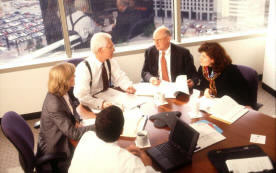
 In a world where business is achieved mainly through people, being involved
in meetings is inevitable. However, where once PAs were involved only in
an administration role, now they are increasingly working alongside managers
to deputise and actively partake.
In a world where business is achieved mainly through people, being involved
in meetings is inevitable. However, where once PAs were involved only in
an administration role, now they are increasingly working alongside managers
to deputise and actively partake.
Meetings allow a group of people to focus on one topic. They should increase efficiency as they gather all parties together to provide information, make decisions and/or solve problems - even if these parties are not physically in one place, as with tele-conferencing or internet meetings. Meetings also allow everyone to review work, generate new ideas, build partnerships and set goals – they enable people to work as a team, even if this is for a short space of time, or just to secure a goal.
So how do you go about running a truly effective meeting?
Respecting the ChairThe Chair has overall responsibility for the meeting. It is their job to manage the process and gain the decisions that move the agenda forward. If you are partaking actively in the meeting you need to respond to the wishes of the Chair. For example, if the Chair wishes to allow more time on an item, or cut another short, they are usually able to do so.
If you are nervous about raising an item, it can help to talk this through with the Chair beforehand. They will reassure you of the process, and can prove to be a useful ally in the event of any negative comments or major disagreement to your proposals.
What’s the big deal with consensus?
In a meeting, all parties attempt to work towards consensus. This is where everyone agrees on the outcome. Consensus avoids parties backing out later on, but you must be sure that you only agree on topics which you or your manager support. Never be forced by the strength of feeling in the group towards agreeing to an action that you or your manager cannot commit to.
Achieving a consensus outcome can be very time-consuming for the group but makes for a better outcome in the long run. All parties will be more committed to the result if they have agreed every step of the process.
Avoiding the pitfallsBe wary of meetings that:
- do not appear to have any real purpose
- have little or no agenda
- have masses of participants
- have a weak Chair in control
- do not secure or record decisions and actions
- constantly overrun.
These factors indicate that the meetings are either unnecessary or badly managed, and you would be well advised to discuss this with your manager. Many meetings have "sell by" dates and the participants are not always aware that the time has come to review the purpose of the meeting and whether the format is still appropriate.
Understanding the dynamicsUnfortunately meetings are not only used to solve problems and discuss projects. They can become open forums for individuals to "perform" and assert their positions and status, thus creating dynamics (or behavioural games) that are peculiar to that particular group of people, in that particular setting.
In addition to discussing business, people use meetings for a variety of reasons. Have you ever witnessed any of these?
- To get noticed – where else are you given the opportunity to stand up and present in front of senior staff?
- To exhibit their dominance – it isn’t anything against you personally, they just can’t help demonstrating their superiority by talking everyone down.
- To push through their own ideas – by hijacking the meeting or using coercive techniques
- To demonstrate the importance of their ideas – by pushing the ideas of others down
- To play games – such as setting one party off against the other
- To promote their own creativity – by describing a problem, and then magically appearing to solve the problem themselves.
It is impossible not to be involved in the dynamics of a meeting, unless you are purely an observer. Your very presence contributes towards the dynamic mix! However, if you feel that some of the participants are using the meeting to play their own games, discuss this with your manager, too! It can be a real time-waster if you become merely an audience for other people's manoeuvering.
Follow up
Always follow up any meeting with a full de-brief to your manager, together with an outline of any action points attributed to them. It may be that you become more involved in the entire project through follow-up work and implementing some of the actions.
Take every opportunity to deputise for your manager by partaking fully in meetings. Being an active participant can be a stimulating and developing experience, and offers great networking opportunities – after all, only meetings offer you a regular showcase for you to impress a large audience of decision makers with your professionalism, communication skills and style!- Try not to get nervous, read up on the previous set of minutes, and ask your manager about any contentious issues
- If you need to speak or raise an item, take a deep breath and deliver your point assertively
- Meeting styles vary. Some will require the speaker to stand, others do not. Follow the practice of everyone else
- If you need to deliver an item in a meeting, think about what you need to say beforehand and try to give it some structure. Consider what the other participants may need to know
- Use positive body language and try to minimise any distracting habits such as pencil chewing or pen tapping
- Be aware that other people may try to dominate the meeting – this is not directed as a personal slight but is often driven by dynamics
- Never feel that you have to agree to issues there and then. It is quite acceptable to say, “I need to take this back to my manager for further discussion (or their authority)”









